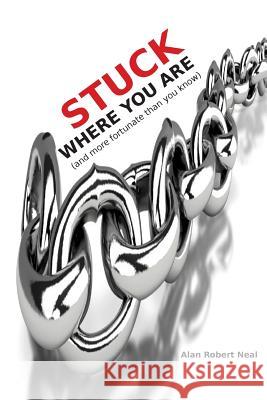Stuck Where You Are: and more fortunate than you know » książka
Stuck Where You Are: and more fortunate than you know
ISBN-13: 9780615815541 / Angielski / Miękka / 2013 / 204 str.
When I was a kid, a friend's wooden glider got lodged into a tree, and I attempted to free it with the toss of a rock. Unfortunately, I had not accounted for the fact that I was standing on an incline, so what I thought was straight up was not. The rock never came close to the glider or even the tree. Instead, it came crashing down on an unintended target, thus shattering two things: the windshield of a Chevy Impala, and the neighborhood record for the most expensive window broken by an eight year-old. We are all affected by our foundation, whether it is the physical ground on which we stand, or the emotional one on which our well-being is based. As adults, we look for level ground. Better situations. Better people. Better circumstances. But often, it still doesn't feel right. No matter what we do, for some, the ground continues to feel un-level. If you had spent your entire childhood standing on an incline, what are the chances of you knowing how to stand up straight? Given your experience, what feels like level ground might really be a hill. So, by the time you reach adolescence and adulthood, the ground isn't your problem. It's your posture and your perception. And, if you don't realize it, you will continue standing on hills while wondering why everything keeps rolling away. To paraphrase Confucius and Buckaroo Banzai, "Wherever we go, there we are." That's the very definition of being stuck. Most people either feel stuck or worry about getting stuck - either fearful of not achieving what they want, or afraid of losing it once they get it. If they're not changing their circumstances, they're trying to change themselves. All the while, they say they want to be loved for who they are, but in most cases, by "who they are" they mean "who they wish we were." That's the reason I wrote "Stuck Where You Are." It wasn't written with a particular type of person in mind, other than someone who is interested in personal growth. There's no arguing about the benefit of books for specific audiences - books for women, books for married couples, etc. - but, just as it is for learning an instrument or playing a sport, there are fundamentals that apply to all people. For instance, you wouldn't go to a piano teacher to learn the violin, or a football coach to learn baseball, but you would certainly benefit from learning the fundamentals of proper breathing, nutrition, posture, and rest no matter which instrument or sport you were playing. Likewise, there are some essential fundamentals related to how we can assess, treat, and grow ourselves. Since it's often easier to recognize our own behavior when we see it in someone else, the book contains several dozen very short stories about several dozen people. As the stories illustrate, it's not a matter of age, gender, or circumstance. It's about being human. So many of our misunderstandings start at any early age and get compounded. There's no original thinking in that conclusion. What might be different from the norm, in my approach, is that I don't believe that anything should be thrown out. I think all of our thoughts and behaviors, no matter how inconvenient, can be beneficial if properly applied. Maybe what you think are your problems are not. And, if that's the case, many of your childhood solutions and declarations don't apply. Maybe the ground and you are just fine, and the biggest problem you have is that you simply don't know it.











